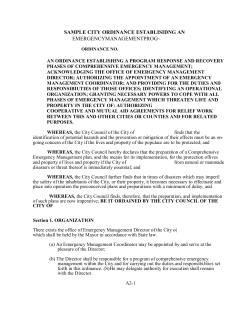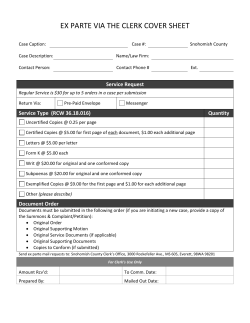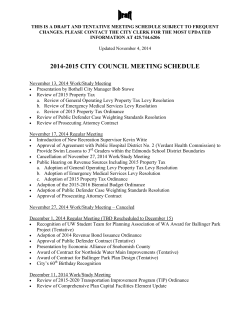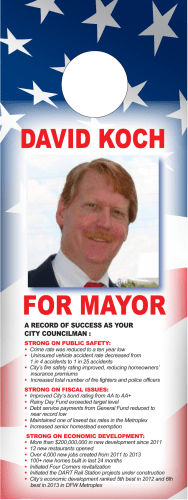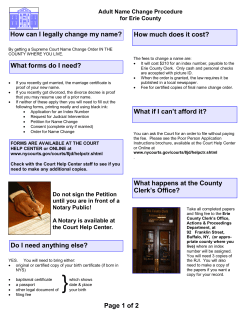
Sample Rules of Order Ordinance Adopting Rules Of Order
Sample Rules of Order Ordinance Adopting Rules Of Order For Council Meetings And Enactment Of Ordinances WHEREAS, S.C. Code Ann. 5-7-250 (1976) requires council to determine its own rules and order of business, and 5-7-260 through 5-7-290 provide for the form, method of adoption, and codification of ordinances; Code 5-7-250 authorizes a council to adopt its own rules and order of business. Rules must not conflict with general state law. NOW, THEREFORE, BE IT ORDAINED by the Mayor and Council of the [City or Town] of ___________________ that the following rules of order are adopted and shall be codified: Section 1. Quorum and rules of order. (a) A majority of council members serving constitutes a quorum for the conduct of business at any meeting. The mayor or mayor pro tempore shall preside, except that, when both are absent, the members present shall elect a presiding member. A member present but disqualified from voting on a question by state law due to a conflict of interest shall be counted for purposes of a quorum. The FOI Act [30-4-20(e)] provides that a quorum is a majority of the constituent membership unless otherwise defined by applicable law. Code 5-7-190 provides that the mayor pro tempore shall act in the absence of the mayor The provisions for electing a presiding member in the absence of both the mayor and mayor pro tempore, and counting a disqualified member for purposes of a quorum are suggested for adoption under Code 5-7-250(b) authority to adopt rules of order and procedure. (b) Except as otherwise required by state law or this code, all proceedings shall be governed by Robert’s Rules of Order, Newly Revised 10th Edition, and the City/Town attorney shall act as parliamentarian. Questions of order shall be decided by the mayor without debate, subject to appeal to the council. Suggested as a local rule. 1 Section 2. Agenda. Matters to be considered by council at a regular or special meeting shall be placed on a written agenda publicly posted by the City/Town clerk at least 24 hours prior to the meeting. The deadline for agenda item requests is __________. Matters not on the agenda may be considered upon request of a member unless two members object. The FOI Act [30-4-80] requires that an agenda for a special or regular meeting (if an agenda exists for a regular meeting) be posted on a bulletin board at the place of meeting at least 24 hours prior to a meeting. Notice of a special meeting must be posted 24 hours before the meeting. A schedule of regular meetings must be published at the beginning of each calendar year. Items shall be listed on the agenda in the order specified by the mayor. The addition of matters to the agenda is suggested as a local rule. Section 3. Meetings of Council. (a) Regular meetings of council shall be held at _____________ a.m./p.m. on the ___________________ in each month unless changed by majority vote of members present at any regular or special meeting. Code 5-7-250(a) requires a council to meet at least once in every month at times and places the council may prescribe by rule. (b) Special meetings of council may be held on the call of the Mayor or a majority of members of council. The City/Town Clerk shall at least 24 hours prior to a special meeting post notice and agenda on the bulletin board and give notice to all available members of council, persons, organizations, and news media which request notification. Code 5-7-250(a) authorizes special meetings on the call of the mayor or a majority of members of council. Notice and agenda provisions must meet FOI Act requirements. (c) All regular and special meetings of council shall be open to the public. The FOI Act [ 30-4-60] requires every meeting of a public body to be open to the public unless closed pursuant to 30-4-70 authorizing executive sessions. 2 Section 4. Executive sessions. (a) By majority vote in a public meeting, council may hold an executive session as permitted by the South Carolina Freedom of Information Act, S.C. Code 30-4-70. Executive sessions may be held for reasons set forth in Code 30-470. The vote to go into executive session must be taken in public, and the reason must be stated. (b) No vote or formal action shall be taken in executive session except to adjourn or return to public session. FOI Act [30-4-70(b)] prohibits a vote or action in executive session with these exceptions. (c) Minutes of executive sessions shall not be taken unless required by majority vote of council. Minutes of executive sessions shall not be publicrecords. FOI Act [30-04-90] require minutes of all public meetings. Minutes are not required for executive sessions; however if minutes of executive sessions are kept, they are not public records under Code 30-4-50(7). (d) It shall be unlawful for a member of council or person in attendance to disclose to another person or make public the substance of a matter discussed in executive session. Suggested as a possible local rule. This provision should be regarded as a rule governing conduct of members of council. It does not conflict with the FOI Act. It may be defended as a limitation on the freedom of speech for an overriding public interest in having government business conducted properly. Section 5. Voting requirements. (a) All actions of council shall be by majority vote of members present at a public meeting, including suspension of a rule of order; provided that an ordinance amending rules of order shall be adopted by a majority of members serving. No proxy, mail, telephonic, facsimile, electronic or absentee vote may be cast. Suggested as a local rule. 3 (b) Every member of council present, including the mayor or presiding member, shall vote on every question except when required to refrain from voting by State law. Suggested as a local rule. If voluntary abstentions are allowed, a provision that an abstention shall be recorded in the minutes as a vote in favor of the motion is suggested. (c) A roll call vote may be required by any member of council. Suggestd as a local rule. (d) The vote on every question shall be recorded in the minutes. Required by FOI Act [ 30-4-50(7)]. (e) No member of council may leave the council chamber while in public session without permission of the presiding officer. Suggested as a local rule. Section 6. Motions. (a) A motion may be made orally or in writing; however, a motion shall be reduced to writing at the request of any member of council. Suggested as a local rule. (b) A motion to reconsider must be made by a member who voted with the majority, and it must be made at the same or next succeeding meeting. Robert’s Rules allow a motion to reconsider only on the same day the vote was taken. Allowing a motion to reconsider at the next meeting is suggested as a local rule. (c) A substitute motion may be made only for purposes of restating and clarifying a pending motion and amendments; it may not be used to introduce a new or alternative proposal. This provision conforms to Robert’s Rules and is suggested as a reminder. 4 Section 7. Minutes of meetings. The City/Town Clerk shall keep minutes of all public meetings which shall be a matter of permanent public record. At each regular council meeting the minutes of the previous meeting must be presented for approval. Minutes do not constitute the official record of a meeting until approved by council. A member of council may place a written expression of position on a matter in the minutes not later than the next regular meeting. Code 5-7-220 requires the clerk to keep minutes of council meetings which are made public records by Code 5-7-250(b) and the FOI Act [ 30-4-50(7)]. Section 8. Appearance of citizens. Any citizen of the municipality may speak at a regular meeting on a matter pertaining to municipal services and operation, except personnel matters, by signing an agenda list maintained by the clerk prior to the meeting stating the subject and purpose for speaking. Each person who gives notice may speak at a time designated by the mayor and may be limited to a [two (2)] minute presentation at the discretion of the mayor. Suggested as a local rule. Section 9. Attorney to attend; parliamentarian; duties. The City/Town attorney shall attend all meetings of council unless excused by council. The attorney shall act as parliamentarian, propose ordinances and resolutions, review all ordinances, resolutions and documents presented to council and give opinions on questions of procedure, form, and law to members of council. Suggested as a local rule. If the attorney is not required to attend all meetings, the council should designate a parliamentarian if one is needed. Section 10. Clerk to attend; duties. The City/Town clerk is ex officio clerk of council. The clerk shall give notices of meetings, post agenda, attend regular and special meetings, record votes of council, keep minutes of council meetings, and perform such other duties as may be assigned. Statutory duties of the clerk are prescribed in Code 5-7-220. 5 Section 11. Hearings by committee. Council may appoint a special committee to assist in or hold a public hearing for council at any time upon any matter pending before it. Minutes or reports of hearings held by special committee shall be filed with the City/Town clerk as a public record. Suggested as a local rule. Section 12. Ordinances required. (a) Council shall act by ordinance in all matters required by law to be done by ordinance, including: 1. Adopt or amend an administrative code or establish, alter or abolish any municipal department, office or agency; 2. Provide for a fine or other penalty or establish a rule or regulation in which a fine or other penalty is imposed for violation; 3. Appropriate funds and adopt a budget; 4. Grant, renew or extend franchises, licenses, or rights in public streets or public property, and close abandoned streets, after public newspaper notice and public hearing; 5. Levy taxes, assess property for improvements or establish service charges for services; 6. Annex area to the municipality; 7. Convey or lease or authorize the conveyance or lease of any lands of the municipality; and 8. Amend or repeal any ordinance. (b) In all other matters council may act either by ordinance or resolution, written or oral, recorded in the minutes. Provisions of this section are required by Code 5-7-260 and other statutes. Section 13. Form of ordinances and resolutions. (a) Every proposed ordinance shall be introduced in writing in the form required for final adoption which shall include: 1. 2. 3. 4. A title briefly describing the content; Findings, reasons, or basis for the ordinance, if desired and appropriate; An enacting clause; The provisions of the ordinance including section numbers if the ordinance is to be codified or amends an existing codified ordinance; 5. Citation of any ordinance repealed; 6 6. The effective date of the ordinance; 7. The name of the person requesting introduction of the ordinance; 8. The approval of the City/Town attorney as to form and the assignment of an ordinance number; 9. Space for dates of readings and public hearing, if appropriate; and 10. Space for the signatures of the mayor or presiding member of council and the municipal clerk attesting notice, if required, and adoption. (b) Written resolutions may be in similar form approved by the City attorney. Code 5-7-270 requires all ordinances to be introduced in writing in the form required for final adoption pursuant to rules for adoption established by council. Section 14. Introduction of ordinances. An ordinance may be proposed by any member of council. A proposed ordinance shall be referred to the City/Town attorney for approval as to form. The City/Town attorney shall render assistance in the preparation of notices and ordinances. After an ordinance is in proper form, the City/Town attorney shall send the ordinance to the City/Town clerk to be held for public inspection. An ordinance is considered to be introduced when it appears on an agenda, or is added to an agenda, for a public meeting of council and its title is read. Suggested as a local rule. Section 15. Enactment of ordinances. (a) An ordinance must be prepared in writing and introduced in the form required for final adoption as required by Section 13. (b) No ordinance may be adopted until it has been read two times and on separate days with at least six days between each reading. (c) An emergency ordinance may be adopted on one reading without notice or hearing by affirmative vote of two-thirds of members present. An emergency ordinance may not levy taxes or relate to a franchise or a service fee. An emergency ordinance expires automatically on the sixty-first day following enactment. Sections (a), (b) and (c) are required by Code 5-7-250 and 270. (d) The introduction and reading of any ordinance shall be by the reading of the title only unless full reading is requested by a member of council. Suggested as a local rule. 7 (e) After the introduction of an ordinance, a member of council may request a public hearing which may be held if approved by a majority of council present and set for a time prior to final adoption of the ordinance. A public hearing may be held on the same date as the final reading. Suggested as a local rule. (f) Any ordinance may be amended on final reading. Suggested as a local rule. The General Assembly allows amendment on final reading. (g) Upon final adoption by vote of council, an ordinance shall be signed by the mayor or presiding member of council and attested by the City/Town clerk, who shall file the original with the minutes in the permanent public records. Suggested as a local rule. Section 16. Introduction of resolutions. A voice motion is considered to be the introduction of an oral resolution which requires no written record other than a notation in the minutes of the meeting. A resolution proposed in writing shall be introduced in the same manner as an ordinance. Suggested as a local rule. Section 17. Adoption of resolutions. Written resolutions may be adopted on one reading unless a public hearing is set by majority vote of council members present. Suggested as a local rule. Section 18. Codification of ordinances. All ordinances shall be codified and updated annually in a looseleaf Code of Ordinances, except those adopted by reference and maintained in separate volumes, and copies shall be available for public inspection and purchase at reasonable cost. Code 5-7-290 requires codification of ordinances and provision for public inspection. 8
© Copyright 2026

